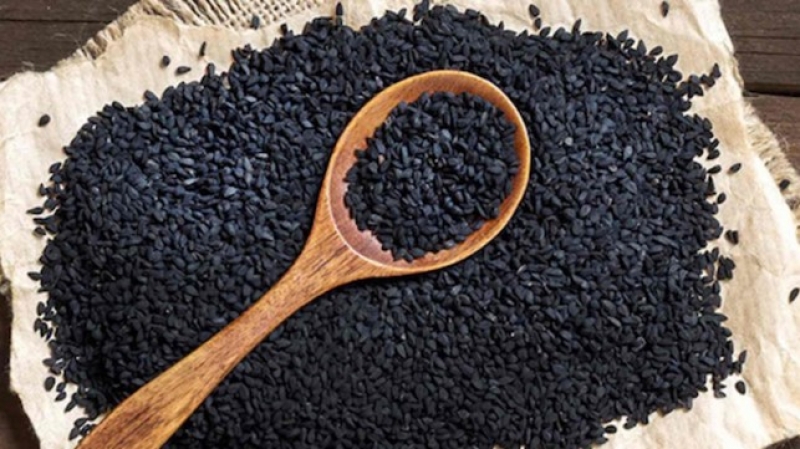There are many studies proving the pharmacological benefits of black cumin (Nigella sativa L.), a medicinal herb with a long historical tradition, and its main bioactive component, thymoquinone. Demonstrated pleiotropic effects include the ability to attenuate oxidative stress and inflammation, promote immunity, cell survival and energy metabolism. In the form of essential oil, paste, powder and extract, it has been indicated in traditional medicine for many illnesses such as asthma, bronchitis, rheumatism, headache, backache, anorexia, amenorrhoea, paralysis, inflammation, mental debilitation, eczema and hypertension.
Black cumin seed and, in particular, its essential oil, contains thymoquinone, thymohydroquinone, thymol, carvacrol, nigellidine, nigellinine and α-ederine, which are mainly responsible for its pharmacological effects and therapeutic benefits.
In several clinical studies, including those in hyperlipidemic patients with smoking habits, postmenopausal women with metabolic diseases, patients with metabolic syndrome and patients with Hashimoto’s thyroiditis, administration of black cumin seeds in different formulations significantly improved the lipid profile and blood glucose.
Together with the preclinical results, observations from these clinical studies suggest that black cumin could be a promising candidate as an anti-obesity and anti-hyperlipidaemic agent.
To date, three clinical trials with patients with type 2 diabetes or diabetic nephropathy have been conducted to evaluate the therapeutic roles of black cumin seeds, reporting significant reductions in blood glucose, serum creatinine, blood urea and 24-hour total urinary protein levels, and increases in glomerular filtration rate, 24-hour total urinary volume and haemoglobin level.
In a randomised, double-blind clinical trial in patients with type 2 diabetes, supplementation was accompanied by an improvement in lipid profile, blood glucose, C-reactive protein level and lipid peroxidation.
In accordance with preclinical studies, a non-randomised, single-blind, controlled clinical trial of diabetic patients treated with a black cumin seed capsule showed a significant improvement in the metabolic picture, with an improvement in insulin resistance and an increase in Hdl cholesterol. Black cumin could therefore be an effective herbal supplement for the management of patients with diabetic complications.
A clinical study demonstrated the efficacy of a combination of black cumin and honey in eradicating gastric H. pylori infection. For this purpose, nineteen patients with H. pylori infection without a history of peptic ulcer, gastric cancer or gastrointestinal bleeding took a compound consisting of 6 g/day of black cumin as ground seeds and 12 g/day of honey, three times daily after meals for a fortnight. The results led to the conclusion that the mixture could be a potential anti-H. pylori and anti-dyspeptic agent.
However, in another clinical study of 46 patients with mild to moderate active ulcerative colitis, supplementation with 2 g/day of black cumin powder for 6 weeks showed no difference, and some adverse effects were reported, including nausea, bloating and a burning sensation. Considering the results of preclinical and clinical studies, it is thought that black cumin may be a potential gastroprotective agent, but its clinical use is not yet suggested.
Several recent studies have used the synthesis of black cumin nanoparticle to improve its bioavailability and pharmacological effects, but most of the investigation has only been carried out at the preclinical level and it is therefore essential to carry out the study in humans to translate the results into clinical use.
In the meantime, it is important to remember that the dietary value of black cumin, although less focused on in the scientific literature, is by no means low, as it contains an adequate amount of protein and fat and an appreciable amount of essential fatty acids, amino acids, vitamins and minerals.
Bibliography
Black Cumin (Nigella sativa L.): A Comprehensive Review on Phytochemistry, Health Benefits, Molecular Pharmacology, and Safety. Nutrients 2021, 13(6), 1784.
A review on possible therapeutic effect of nigella sativa and thymoquinone in neurodegenerative diseases. CNS Neurol. Disord. Drug Targets 2018, 17, 412–420.
Dissecting the potential roles of Nigella sativa and its constituent thymoquinone on the prevention and on the progression of Alzheimer’s disease. Front. Aging Neurosci. 2018, 10, 16.

